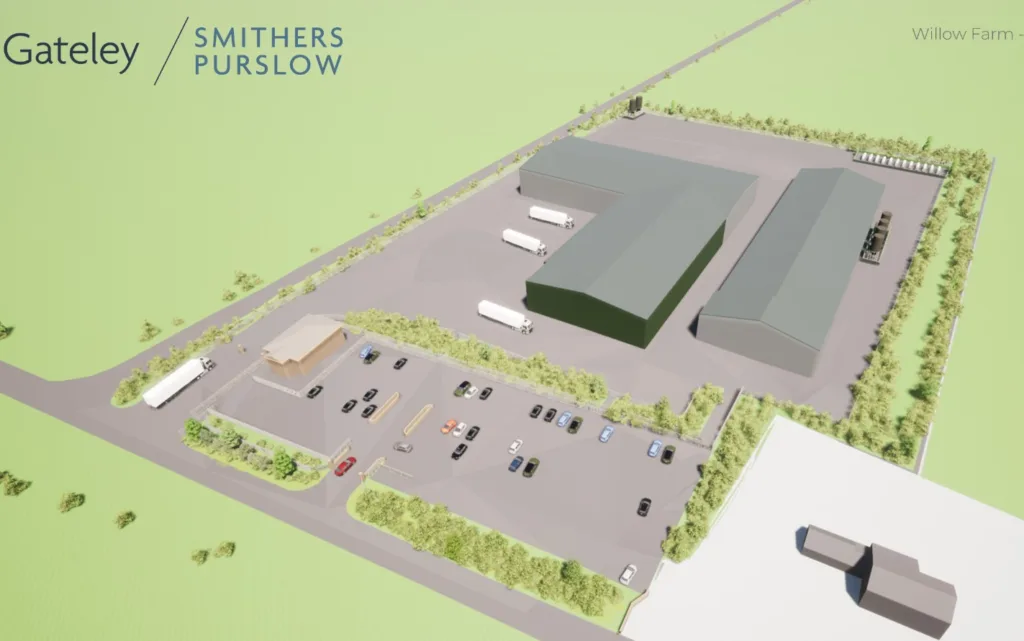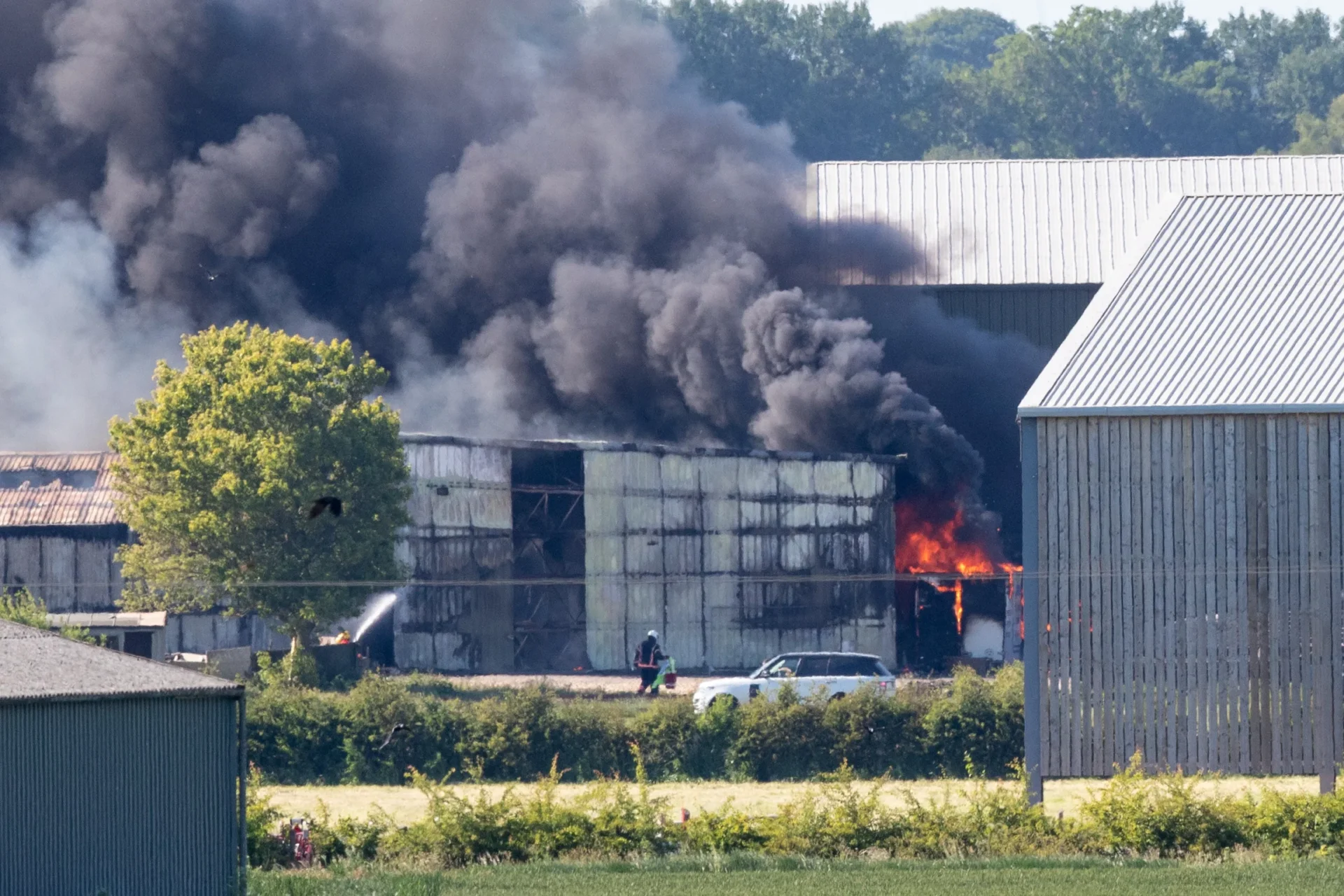Two and a half years after they applied, Corkers Crisps are still bogged down in the planning system to win approval for a new factory following the May 2020 fire that destroyed its factory in the Fens. The blaze devastated the family run business at Willow Farm, Westmoor Common, Ely, which employed over 100 people and had an approximate turnover of £10 million.
The company, which has since added frozen storage to its application, is locked in a Q & A with various agencies pending a decision by East Cambridgeshire District Council.
Corkers says “changes to the shape of the factory will allow for smoother operations and reduce the transport in and out of the site.

“Through having two structured buildings, it will allow for lower external activity during the day as there will be less transfer of products and goods between buildings.
“The inclusion of the frozen storage area will prevent the need for product coming off the local fields, being washed and sorted, and then transported to a third-party cold store. This will reduce the number of HGV’s going through the local villages and using the narrow roads.”
And it says the formation of a formal parking area (for 128 vehicles, a number queried by council officers) will tidy the site and shall ensure safety for those working on site and those travelling nearby.
“Previously parking was across several instances of rough hardcore, through which HGV’s and other deliveries were travelling,” the company said in its formal application.
Parking provision at the site is proposed to comprise 128 car parking spaces, 5 HGV loading bays, and 10 cycle parking spaces, an increase of 57 car parking spaces and 1 HGV loading bay from the previous provision (71 car parking spaces and 3 HGV loading bays)
One stumbling block appears to the Environment Agency (EA) who, last month, despite offering no objection to the plans, asked for a planning condition “that we recommend is included.
“Without this condition included, we would object to this proposal as per the National Planning Policy Framework (NPPF”
The agency says the application has insufficient information regarding foul and surface water drainage arrangement and measures would need to be implemented to overcome their objection.

It asks the council to agree that no work begins on the new factory “until such time as a scheme to dispose of foul and surface water has been submitted to, and approved in writing by, the local planning authority”.
The EA also queries a “number of large storage tanks mentioned in this application; however, we cannot see any details of what they will contain, or the arrangements for secondary containment”.
In August, the planning files reveal a series of questions posed to Corkers agents from Richard Fitzjohn, who described himself as planning contractor East Cambridgeshire District Council
He suggested that with the way the previous factory had grown, the application could more accurately be described as “redevelopment of existing site to provide a manufacturing facility for the production of crisps comprising an extension to the existing building, new manufacturing building, offices and car park (sui generis)’.
He also said he wanted to have “a more definitive idea of the scale of the business”

“Dear friends of Corkers Crisps, the business suffered extensive fire and smoke damage at its Willow Farm site in Ely, Cambs at 3pm on Saturday 30th May. Once the alarm was raised all colleagues were promptly evacuated and we are pleased to confirm that no one was hurt. We would like to thank the emergency services for their skill and their speed in getting to the site.
We thank all customers, suppliers and friends of Corkers Crisps who have sent kind messages of support.
We are working towards having a limited range of Corkers back on the shelves as soon as we can.
With our best wishes, the Corkers team.
His questions included number of people directly employed by Taylor Farm/Corker Crisps and attending the site, numbers on the site at any one time, shift patterns, visitors, and what was held in the storage tanks.
“What will their appearance and scale be?” asked. “And what is being stored in the frozen storage?”
His other questions ranged from parking, staff access to electric gates, cycle storage.
“On site we discussed the volume of car parking and its justification – please could you provide a short statement to evidence why 128 spaces have been provided,” he said.
“I would also like to see provision for electric charging points on a percentage of the spaces to future proof the parking arrangements.
He added: “The previous built form on the site was a collection of buildings which had grown over time and gradually connected to form the overall floor area.
“The openness of the surroundings means these buildings are going to be visually prominent and whilst this is the redevelopment of the site, the proposal includes buildings which are more streamlined and results in blocks of massing in the countryside.
“The application needs to demonstrate the massing of built form would not harm the rural landscape or result in dominant features.
“There are concerns over the colour choice for the main buildings and proposed ridge heights of the main manufacturing. I cannot see any justification/evidence to illustrate why this design has been applied to the site.”
The planning officer also added: “If the operation is to be 24/7 as indicated in the noise report, please advise whether this is just for manufacturing or all aspects. Will forklifts be operating 24/7?
“Environmental health have requested that forklifts and vehicles under the control of the applicant to be fitted with broadband/white noise reversing alarms. Please advise if you are willing to adopt this? “
The original target date for determining the application was May 2022 – this was later put back to April 2023.
No new target date has since been mentioned.























